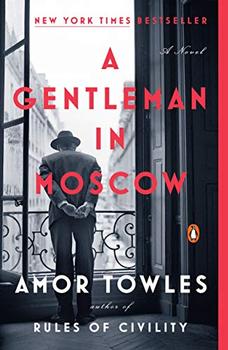Summary | Excerpt | Reading Guide | Reviews | Beyond the book | Read-Alikes | Genres & Themes | Author Bio

It is June 21, 1922, and 33-year-old Count Alexander Ilyich Rostov is convicted of being a class enemy of the Soviet Socialist Republic. Instead of being shot as would normally be the result, he is sentenced to live the rest of his life in his current residence: Moscow's Hotel Metropol (see 'Beyond the Book'). So begins Amor Towles' novel, A Gentleman in Moscow. What follows is an account of Rostov's life over the next thirty-plus years as he makes friendships, finds ways to occupy his days, and watches a slice of the history of Stalinist Russia unfold from the relative safety of the Metropol.
The Count is handsome, charming, wealthy, erudite and witty. He conquers every situation with aplomb, and following his adventures is a fun ride. The novel feels very innocent, harkening back to a time when books and movies contained good clean fun; totally absent are the cruder forms of comedy one often finds in today's entertainment media.
While A Gentleman in Moscow includes some account of changing conditions in the USSR (for example, a minor plotline concerns idealistic youths heading out to collectivize the farms, and another touches on the repression of artistic expression), history isn't the book's primary concern. The main focus is on the Count and those who move in and out of his orbit over the years, such as Andrey, the hotel restaurant's maître d'; and desk clerk Arkady, whose talent is to know where everyone in the hotel is at all times. Not only are these portraits brilliantly drawn, they're not static. Over the course of the novel the characters grow and mature, giving them a realistic touch.
The novel was a bit of a surprise as I was expecting something much darker and more reflective of the terror and paranoia rampant in Soviet Russia during the period. I have not read a book set in this era and locale that is lighthearted; A Gentleman in Moscow is likely the first. That's not to say that it doesn't have its tragic moments and poignant scenes, but overall it's pretty upbeat. Once I dropped my preconceived ideas of what the book should be about (i.e., horror stories about Stalin's regime) and simply let things unfold, I found myself enjoying it a lot more. A Gentleman in Moscow is fast-paced, aided by the fact that Towles keeps the use of patronymics and honorifics to a minimum, abandoning the use of four or five different names for each character as is so common in Russian literature.
There's not a lot of plot here, particularly as the narrative begins; in fact it's somewhat anecdotal until a little more than halfway through when an unexpected arrival at the hotel disrupts the Count's routine, at which point the action feels more focused. Around page 200, I found myself wondering whether or not the book was going anywhere, as frankly I was beginning to get a little bored. After the midpoint though, I found the novel increasingly hard to put down; the pages fly as the plot speeds to its conclusion.
Although getting to the meat of the book requires some patience, it's definitely worth it. The Count is one of literature's more memorable characters, and A Gentleman in Moscow is a well-written novel worthy of one's time. The book is sure to win Towles new fans as well as satisfy those already familiar with his writing.
![]() This review was originally published in The BookBrowse Review in September 2016, and has been updated for the
December 2016 edition.
Click here to go to this issue.
This review was originally published in The BookBrowse Review in September 2016, and has been updated for the
December 2016 edition.
Click here to go to this issue.

If you liked A Gentleman in Moscow, try these:

by Katherine Arden
Published 2025
During the Great War, a combat nurse searches for her brother, believed dead in the trenches despite eerie signs that suggest otherwise, in this hauntingly beautiful historical novel with a speculative twist, from the New York Times bestselling author of The Bear and the Nightingale.

by Paulina Bren
Published 2022
From award-winning author Paulina Bren comes the first history of New York's most famous residential hotel - The Barbizon - and the remarkable women who lived there.
Your guide toexceptional books
BookBrowse seeks out and recommends the best in contemporary fiction and nonfiction—books that not only engage and entertain but also deepen our understanding of ourselves and the world around us.